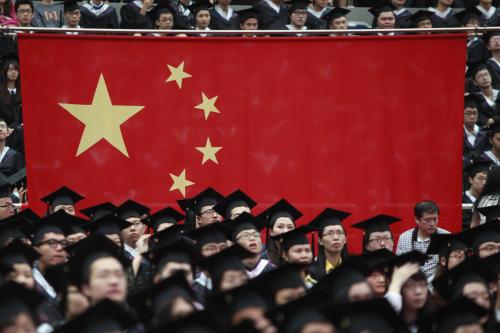Transcript of a video Q&A
JEFFREY A. BADER: The John L. Thornton China Center was set up a few years ago at the Brookings Institution in order to provide a resource for Americans to understand what’s going on in China and also to help Chinese understand where they can go in the United States to find the best talent and the best minds and the best experts on the development issues that they’re facing. China and the U.S. are going to be the dominant powers of the 21st century, because they’re going to be the two biggest economies in the world in a few years. These two countries are going to be number one and two trading countries in the world, they’re going to consume the most energy in the world. They need to understand each other, and that’s what the Thornton China Center is all about.
CHENG LI: We’re holding a conference which is called Changes in China’s Political Landscape: 17th Congress and Beyond. Now, talking about the changes of landscape, we refer to the rise of the middle class, rise of NGOs, and rise of lawyers, and also the dynamic changes between state and society, and dynamic changes within the leadership. Now, of course we’re focused on the 17th Party Congress because this is an important occasion for leadership change, and for review of the current domestic and foreign policy. And also as a result of this Conference, sixteen percent of senior leaders will retire, and the new generation, which is called “Fifth Generation”, will emerge as a major player in the Chinese political system.
|
LI: This generation grew up during the Cultural Revolution and they were “sent down youths” and served as manual laborers or farmers for many years, or decades, during the Cultural Revolution. For them, actually, it’s a tremendous comeback after the Cultural Revolution. They went to school, they received education, they became political leaders. Many of them actually are trained lawyers. So it’s a transition from rule by technocrats to rule by lawyers and economists, so that itself is important and interesting. At the same time, these groups represent different regions, different social constituencies. So those are also important issues to watch.
BADER: China remains a dictatorship. This is 1.3 billion people who are outside of the mainstream of democratic developments of the last 15-20 years. Americans need to understand what’s going on in China. There’s a lot going on beneath the surface. Americans are very concerned about what in the long run it means to have a country with 1.3 billion people with nuclear weapons, with growing military power, growing economic power, that’s ruled by one party. This conference is going to help expose Americans to what is going on behind the scenes and give them a sense of the future evolution of China’s political system.
CONFERENCE INFORMATION
April 12 agenda | Panel I | Panel II | Keynote | Panel III
April 13 agenda | Panel IV | Panel V




Commentary
Q&A: China Leadership Conference
April 11, 2007